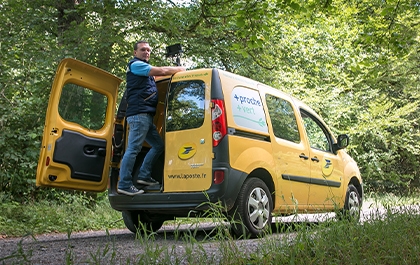Improving air quality
Even before it was obliged to do so by the law on mobility (LOM) and the introduction of low-emission zones (ZFE), La Poste set itself targets for reducing emissions from its own fleet of vehicles. It is one of the first companies in the world to have set air pollution targets.
As set out in its strategic plan, La Poste has set itself the target of reducing by 60% by 2025. By the end of 2023, for La Poste's fleet, the reduction of NOX will be 56.7% lower than in 2015.
79% of Vehiposte's fleet now complies with the latest EURO standards.
Measuring our emissions of local atmospheric pollutants
La Poste has introduced an extended measurement system that includes the subcontractors' fleet. The measurement is based on referenced methodologies (COPERT and HBEFA). Given the complexity of the measurement tool, the extended measurement will be published every other year (2024, 2026, etc.). The reduction in emissions of atmospheric pollutants from the internal fleets and subcontractors of La Poste and Geopost is one of the indicators monitored by the Mission Committee.
Acting for a sustainable city
The reduction in emissions achieved by La Poste is the result of a number of actions, including:
Eco-driving training;
Renewing the fleet with vehicles that consume less fuel and emit fewer pollutants;
Increasing the number of electric vehicles and other low-emission delivery methods, such as cargo bikes.
the development of cyclo-logistics and Pickup delivery solutions.
To make the city sustainable, La Poste is also working to reduce noise pollution in the last kilometre (engine noise, tyre friction on cobbled roads, etc.). In particular, it has replaced internal combustion engines with electric/GNV vehicles, or upgraded them to meet the latest European "Euro" standards. In 2023, 28% of routes will be covered by soft modes of transport (pedestrians, bicycles and all electric vehicles), which produce no noise pollution.
La Poste is also positioning itself as a partner to local authorities in monitoring air quality. It relies on its vast postal network (vehicles and locations) and solutions based on sensors (fixed and mobile), enabling air quality to be monitored in real time, through its subsidiary Geoptis.
Since the end of 2019, Geopost has deployed sensors across Europe on its delivery fleet as well as in its urban depots and Pickup points. This programme has now been deployed in thirteen European cities (Lisbon, Paris, Madrid, etc.). A total of 1,100 sensors have been installed.

